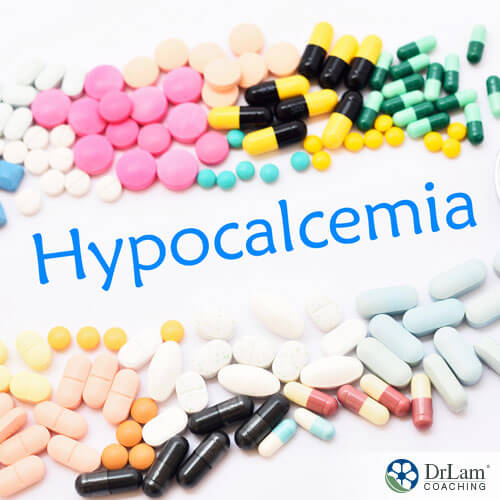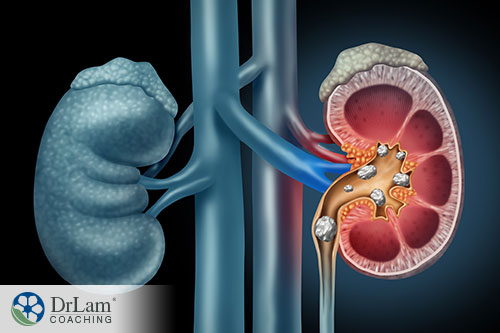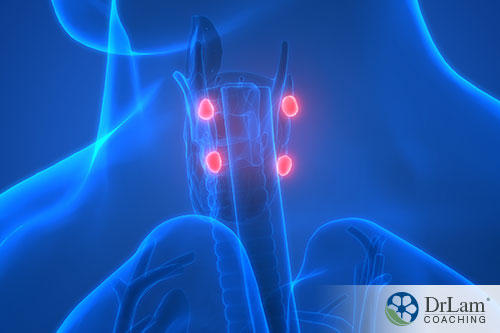When you have Adrenal Fatigue Syndrome (AFS) it often sets off a combination of conditions, disorders, and dysfunctions throughout your body. This is part of what makes it so very difficult to recover from. One of the issues that can arise with this disorder is problems with your parathyroid glands. This often-forgotten cluster of glands is essential for your daily functioning, and when they become unbalanced the results can be catastrophic. Hypercalcemia is one of the many conditions that can result from this, and it will not only affect your health and quality of life, it will also worsen your AFS.
 Hypercalcemia means high calcium levels in your blood. Calcium is a mineral that plays an important role in the functioning of your body. It is stored primarily in the bones and a small percentage circulates in the blood. The balance of calcium level is maintained by a combination of calcium from your diet, its absorption by the intestine into the blood, its excretion by the kidney and bone remodeling. This balance can either be neutral, positive or negative and this depends on factors like aging, growth, your habits, and your genes. Additionally, there are hormones that again work, with the kidneys, skeleton, and intestines to carefully regulate the calcium levels in the blood. This process is known as homeostasis. Disruption of homeostasis along with other factors, alter your blood calcium levels.
Hypercalcemia means high calcium levels in your blood. Calcium is a mineral that plays an important role in the functioning of your body. It is stored primarily in the bones and a small percentage circulates in the blood. The balance of calcium level is maintained by a combination of calcium from your diet, its absorption by the intestine into the blood, its excretion by the kidney and bone remodeling. This balance can either be neutral, positive or negative and this depends on factors like aging, growth, your habits, and your genes. Additionally, there are hormones that again work, with the kidneys, skeleton, and intestines to carefully regulate the calcium levels in the blood. This process is known as homeostasis. Disruption of homeostasis along with other factors, alter your blood calcium levels.
The main hormone that mostly causes hypercalcemia is called the parathyroid hormone. This hormone is released by a cluster of small glands called the parathyroid glands which are located in the neck region and in very close proximity of the thyroid gland. When the parathyroid glands become overactive, an excess hormone is released.
Hypercalcemia is dangerous. It may lead to serious complications like kidney stones, weak bones, and dysfunction of the heart and brain. Ironically, the symptoms of hypercalcemia are not unique to this condition and therefore the clinicians often fail to assess them on time.
The symptoms of this disorder can range from almost non-existent to very severe, which is debilitating. This variability often makes it difficult to pinpoint the actual cause. Some of the most common symptoms of hypercalcemia are:
If you have any or all of these symptoms and cannot find a cause, it is worth talking to your medical practitioner about hypercalcemia.
When you have high calcium levels in your blood it can cause a range of problems and disorders. Some of them are mentioned below:

As you are aware, calcium is an essential element in your body. It helps to build strong bones and teeth, assists with muscle functions, and helps the nerves transmit signals. The four tiny parathyroid glands are dedicated to ensuring that your calcium levels remain within the optimum range. When the blood calcium level is low, the parathyroid glands help to increase its level in the following ways:
Given, that a delicate balance of many factors work together to maintain the calcium level in your blood, the slightest disruption may result in hypercalcemia.
There are several common causes of hypercalcemia. These include:
This means you may have hypercalcemia because of many reasons. Therefore it is important that you address the problem based on the cause and the severity of your condition. So, if you think that this disorder may be a problem for you, see your doctor immediately for a blood test to confirm your suspicions.
 The thyroid, which includes the parathyroid, is an essential part of the hormone circuit. This is one of the first circuits in the body to suffer dysfunctions when you have AFS, which is a very common, stress-related disorder. Chronic, long term stress causes the adrenal glands to become fatigued. The adrenals are responsible for excreting cortisol as part of the NeuroEndoMetabolic (NEM) stress response, the body’s most important system for coping with stress. But when the NEM stress response is active for a long period, the adrenals start to malfunction because of the overwork. This causes a variety of problems all throughout the body, most of them starting with the hormone circuit.
The thyroid, which includes the parathyroid, is an essential part of the hormone circuit. This is one of the first circuits in the body to suffer dysfunctions when you have AFS, which is a very common, stress-related disorder. Chronic, long term stress causes the adrenal glands to become fatigued. The adrenals are responsible for excreting cortisol as part of the NeuroEndoMetabolic (NEM) stress response, the body’s most important system for coping with stress. But when the NEM stress response is active for a long period, the adrenals start to malfunction because of the overwork. This causes a variety of problems all throughout the body, most of them starting with the hormone circuit.
The hormone circuit consists of the adrenals, thyroid, and sexual organs. These three systems work in concert and are very tightly connected. So, when the adrenals are overactive because of AFS and ongoing stress, the cortisol overload can cause problems with the functioning of the thyroid and parathyroid. This could result in a range of symptoms. Most often, people with this issue experience glandular underactivity andunder activity, resulting in fatigue. However, everybody’s condition and body are different, which means that they may have hyperactivity and hypercalcemia.
It is often difficult to establish whether the condition is AFS or hypercalcemia because their symptoms are very similar. Both may display symptoms like anxiety, insomnia, irritability, heart palpitations, and inability to handle stress. The blood calcium level may fluctuate at different times, again due to many factors. In severe cases, surgery of the parathyroid gland is considered. However, this must be decided with extreme caution, because a major intrusive surgery like this can be contraindicative and make matters worse if you have AFS.
If you are unwell because of AFS, it might seem like a good idea to try supplementing with calcium and vitamin D. Vitamin D deficiency is highly prevalent and it is very common to take a vitamin supplement for its health benefits. However, if you have AFS then this tactic could backfire. Your body is weak and fragile because of AFS and supplements that you think are good for you may actually cause unwanted reactions similar to an allergic reaction. This means that if you have AFS, the supplements could be harmful to you. This hypercalcemia might obstruct the normal functioning of your digestive and excretory system. Clinicians not familiar with AFS may draw the conclusion that there is an issue with the parathyroid gland when in fact the underlying trigger of hypercalcemia lies elsewhere.
 You need to be very careful when it comes to supporting the health of your thyroid and parathyroid and in ensuring that your body has all the nutrients it needs to function properly. Never try to supplement without the help and guidance of a medical professional who is aware of your AFS and knows how your body is likely to react to foreign substances. Instead, it is usually better to improve your diet so that you get all the nutrients you need naturally and in combinations and quantities that are better suited for your body. If you have hypercalcemia type symptoms that are secondary, this will also encourage your parathyroid to heal and start functioning the way it is supposed to.
You need to be very careful when it comes to supporting the health of your thyroid and parathyroid and in ensuring that your body has all the nutrients it needs to function properly. Never try to supplement without the help and guidance of a medical professional who is aware of your AFS and knows how your body is likely to react to foreign substances. Instead, it is usually better to improve your diet so that you get all the nutrients you need naturally and in combinations and quantities that are better suited for your body. If you have hypercalcemia type symptoms that are secondary, this will also encourage your parathyroid to heal and start functioning the way it is supposed to.
Hypercalcemia is not well understood or recognized by the public and yet it is a serious disorder that can affect your quality of life and your overall health. If you have AFS, your risk of this problem is higher than it is for others. It is vital that you are aware of the dangers that can arise from thyroid problems so they can be identified early enough to ensure the best outcome.
© Copyright 2020 Michael Lam, M.D. All Rights Reserved.
Hypercalcemia is usually caused by parathyroid glands that become overactive due to enlargement or benign tumor. It causes high blood calcium and a range of other problems. If you have trouble with your thyroids as a result of AFS, you could be at risk of developing this condition.
